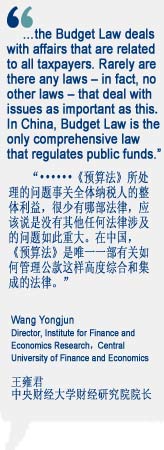解析中国预算
文字实录·Transcript
冯欣:据全国人大的消息,从七月到八月,来自全国的2万多公民就中国的《预算法》修改草案向全国人大提出意见和建议。截至8月5日,全国人大共收到33万多条意见和建议,这是自2005年全国人大在网上征集公众意见以来,收到回复数第二多的一次。但是在多大程度上公众真正关心《预算法》的修改?普通人又如何能弄明白中国的预算?
Feng Xin: Between July and August, more than 20,000 members of the public made comments and suggestions to the National People's Congress, or the NPC, about how to amend China's Budget Law. That's according to the top legislature. The NPC received nearly 330,000 opinions as of Aug 5, which is the second most since the legislature began seeking public opinions online in 2005. Experts say this shows an unusual public interest in government levies and spending. But to what extent does the public really care about amending the Budget Law? And, to go even future, how can ordinary people make sense of China's budget?
街访:您听说过《预算法》吗?
Reporter:Have you heard of the Budget Law?
受访者:没有。
Respondent: No.
受访者:没有。
Respondent: No.
受访者:没有,没听说过。
Respondent: No, never.
受访者:有听说过,但不是特别了解。
Respondent: Yes, but not a lot.
受访者:听说过。《预算法》可能是针对大型企业单位设定的。
Respondent: Yes, I have. I think the Budget Law is specially designed for big companies.
街访:那您知不知道国家的预算是用来做什么的?
Reporter:What do you think a country's budget is used for?
受访者:我觉得预算应该是让人民监督政府来进行每笔财务支出的。
Respondent: I think it's used for the people to monitor the government's spending.
受访者:可能是跟下一年的财政有关系吧。
Respondent: Maybe it has to do with next year's finances.
受访者:(做)计划,我个人是这样认为的。
Respondent: Making plans, I think.
受访者:预算应该是今后几年的一个财务支出计划。
Respondent: It's a plan about future expenditures.
受访者:每年的各方面,包括教育、农业、西部大开发也算,各方面的基础设施的投资。
Respondent: It covers education, agriculture – the Development of the West Regions (national project) also counts – and all sorts of investments in infrastructure.
街访:您觉得国家的收入和支出跟普通人,或者说跟您个人有什么关系?
Reporter: What does the country's revenue and spending have anything to do with you?
受访者:这个关系还挺大的吧,但平常好像不太关注这个,不知道从哪关注。
Respondent: I think it has a lot to do with me, but I didn't pay much attention to it. I didn't know how.
受访者:觉得没什么关系吧。
Not very much.
受访者:跟个人有很大的关系,我是个农民,农民现在已经接近城市养老的系列。
Respondent: I think it has a lot to do with me. I'm a farmer. The farmers' pension system is becoming similar to the city's.
受访者:当然有关系,因为国家使用的钱财都是咱们老百姓的钱。因为它是通过税收征收上来的钱。
Respondent: Of course it's related (to us). All the money the country spends comes from us, the people, from the taxes we pay.
街访:对于国家的预算,有哪些是您想知道但是却不知道的?
Reporter: In terms of the country's budget, is there anything you'd like to know?
受访者:我之前有看过一个关于美国和中国的对比,美国的预算可以说做得非常细,而且做得基本上面向公众,公开的。而国内好像大部分人如果真的想了解,还挺难了解细节的。
Respondent: I read something about comparing China's and the United States' budget. The US budget is said to be very detailed, open and transparent, whereas in China, it would be quite difficult for most people to know details.
受访者:比如你政府的钱是怎么花的,预算执行情况,但是我们都不知道。
Respondent: Like how the government spends the money and implements the budget, we don't know.
受访者:从新闻角度知道的就是三公费,我觉得这些只是特别小的一个侧面。从大的侧面来讲,比如说大的国营企业,它的经营效果,经营情况,老百姓一般是很少很少知道的。包括一些项目的开发,该不该开发,应该如何去开发,老百姓不清楚这些事情,他也不关心这些事情,但是这些事我觉得国家有义务去公布。
Respondent: We often hear news about "sangong spending" (official receptions, cars and visits), but I think this is only a small facet of the issue. Speaking about a larger facet, people rarely know how State-owned enterprises operate.There are also some projects. Should they be launched in the first place? And how should they be carried out? Ordinary people don't know about these. Nor do they care. But I think the government has obligations to make them known.
那么国家的预算究竟跟普通人有什么关系?我采访了刘剑文,他是人大立法者的顾问之一。
How is China's budget relevant to individuals? I talked to Liu Jianwen, a consultant to the NPC's lawmakers.
冯欣:刘教授,我听您曾经说过要把《预算法》从神坛上拿下来,让它走入民间,因为它和每个人的衣食住行都有关系。您为什么这么说呢?国家的预算和普通人到底有什么关系?
Feng Xin: Professor Liu, you once said we need to take the Budget Law from the secrete altar to ordinary people's lives, because it's related to everyone. Why did you say this? How is a country's budget relevant to individuals?
刘剑文:我们的预算长期以来是不公开的,老百姓对于预算问题不大了解。因为预算是涉及到国家的一个财政计划,就是像一个家庭一样的,我这一个家庭,每年每月每日有多少收入,有多少支出是一样的道理。从收的方面,国家的收入主要来自哪些方面。一个核心问题是税收问题,还有一个收费问题。因为国家收得越多,意味着老百姓手中的财富越少。它是一个相互关联很强的问题。
Liu Jianwen: Our budgeting has always been opaque, so people do not know much about it. Budget is a country's financial plans – just like a family – how much money do we make and spend every day, month and year? From an income point of view, the core of a country's income is levies and charges. The more money the country taxes, the less wealth the people have. There's a strong correlation.
冯欣:此消彼长的关系?
Feng Xin: Like a counter balance?
刘剑文:对,像我们大家关心的问题,像个人所得税的问题、房产税的问题、车船税的问题,这是大家感觉非常明显的。那么从支的方面来讲,教育,特别是义务教育,义务教育的经费从哪里来,它得靠国家的财政支出。还有我们现在讲的社保问题,甚至包括我们说,在一个地方政府,这个地方政府有多少公职人员,为什么要这些公职人员,每一个公职人员以什么标准给他付工资?还有其他方面。因为这些公职人员是在为纳税人服务,是我纳税人,通过纳税养活这些你这些公职人员,那么你说他们要不要有发言权?
Liu Jianwen: Yes. For example, people feel strong about issues like personal income tax, property tax and vehicle tax. In terms of spending, education, especially compulsory education, and social security insurance all come from the country's spending. To go even further, in a local government, the number of civil servants, why they are hired and based on what criteria they are paid are all to do with government expenditure, because these civil servants are paid by taxpayers. They provide services to taxpayers. Then, don't you think they should have a say?
我们现在是市场经济,市场经济所相应的是公共财政,所谓公共财政是强调这个收入是老百姓的,要由老百姓说了算,要由纳税人说了算。他通过什么东西说了算呢?那就是通过立法,通过预算(法)。这个支出也应该是由老百姓说了算,由纳税人说了算。如果说支出过程中,其他的家庭成员都不知道,一个国家让所有人都不知道我这个钱是怎么花的,我想把钱给谁就给谁,我想把钱投到什么地方就投到什么地方,那你就可以想一想这个过程中,这个支出里会不会产生腐败问题。
We are now operating under a market economy, so that should be matched with a public finance system. A public finance system emphasizes that the income belongs to the people. And they should decide how to use the money. How can they decide? Through legislature and through the Budget Law. The expenditure should also be decided by people, or the taxpayers. If, during the process of spending, no family member knows how it's done – the country doesn't let anyone know – it gives the money to whomever and wherever it wants - it won't be hard to imagine that there will be problems of corruption.
冯欣:我们这次知道人大收到了来自全国两万多公民的33万多条建议和意见,是历史上第二多的一次。但是在我们的街访中发现,很多普通市民根本没有听说过《预算法》,我想问问您制定《预算法》的目的到底是什么?《预算法》这样一部法是用来做什么的?
Feng Xin: We know the NPC has received nearly 330,000 comments and suggestions from 20,000 citizens nationwide. That's the second most in history. But during our street interviews, we found many ordinary people have never even heard of the Budget Law, so what is the purpose of making such a law? What is it used for?
刘剑文:因为你立法的宗旨是决定这个法要解决什么问题,就是这个法的灵魂。我们1994年的《预算法》,当时立法宗旨是这样规定的,我这里有一条:“为了强化预算的分配和监督职能,健全国家对预算的管理,加强国家宏观调控,保障经济和社会的健康发展,根据宪法制定本法。” 这样一种规定,应该说在20世纪90年代初期这样规定我们觉得还是很合适的。它是强调国家对预算的一个管理,强调一个宏观调控。这里实际上是强调对政府内部收支方面的一个管理。
Liu Jianwen: The purpose of a law depends on what problems we want to solve. It's the soul of a law. We established the current Budget Law in 1994, which specified the law's purpose: "In accordance with the Constitution and for the purposes of strengthening the distribution and supervisory function of budget, improving the budget management of the State, intensifying the micro-scope regulation and control of the State and ensuring the sound socio-economic development, this Law is enacted." In fact, such general provisions were proper in the early 1990s. It emphasizes the government's regulation and control of the State budget. It actually emphasizes the government's management of its internal affairs.
冯欣:就是政府的家务事?
Feng Xin: Like the government's family affairs?
刘剑文:是说政府的一个问题,政府内部的一个事情。但是我们从94年到现在已经快20年了,特别我们国家在90年代末期,在1998年提出公共财政的问题,大家强调《预算法》应该解决什么问题?《预算法》究竟是政府内部的、规范政府内部行为的一个法律?还是来控制政府行为的一个法律?所以大家一个基本的观念是我们《预算法》的核心问题是应该(建立)一个规范政府收支行为的法律。
Liu Jianwen: Yes, like its internal affairs. But now nearly two decades have passed. In particular, since we brought up the idea of public finance in 1998, people have been debating what problems the Budget Law should solve. Is it a law that regulates the government's internal affairs? Or is it a law that disciplines the government's behaviors? Now there has been a general agreement that the core of the issue should be about establishing a law that does the latter.
如果说一个国家的预算看上去复杂而且专业性强,我们何不以一个小型机构作为国家的缩影,看看它怎样制定预算?我探访了刘国特,他是北京郊区一家小型出版公司的经理,大约有30名雇员。他告诉我他的公司都需要做哪些种类的预算。
Since a country's budget might often look quite complex and technical, why don't we look at how a much smaller organization makes its budget as a miniature of the big issue? I visited Liu Guote, an owner of a small publishing house in Beijing's suburbs. His company has about 30 employees, and he tells me what types of budgets his company has to make.
刘国特:其实我们做预算的目的,简单点说就是算一下今年准备投入多少钱,到年底我们的收益是多少钱。预算现在我们列为第一项最重要的就是员工工资,其次就是我们一些销售的预算成本,包括我们的发行人员出差的差旅费,包括日常运转费用。我们要计算一些原材料的成本,包括纸张的,印刷的书款,设计等等。
Liu Guote: The purpose of our budgeting, to put it simply, is to estimate how much money we are going to invest this year and how much profit we will get by the end of the year. The most important item in our budgeting is employees' wages. And then, it's our costs of sales, like employees' business trips and other expenditures. We also need to calculate our production costs, like paper, printing, design and so on.
Apart from these regular items, Liu also has some unexpected expenses, like the huge flood that poured into Beijing on July 21.
除了这些开支以外,刘国特还有一些意想不到的开支,比如刚刚经历的北京7.21特大洪水。
刘国特:现在还能闻到一股这里的霉味儿,现在那些被泡的就已经全部是废品了。卖了五十多块钱吧。
Liu Guote: We can still smell the mustiness here. Those soaked books are all ruined now. They were recycled for 50 yuan.
冯欣:一共就五十多块钱?
Feng Xin: Only 50 yuan?
刘国特:按照成本算的话是十万块钱吧。
Liu Guote: Yes. They actually cost 100,000 yuan.
And there is more…
刘国特还有更多的开销。
刘国特:接待基本就是餐饮费用,甚至到北京周边的旅游费用都在里面,很多成本没法算的。
Liu Guote: We also have hospitality expenses, like dinner or even tours around Beijing. Those were impossible to calculate.
如果我们解构一下刘国特的预算,我们可以发现他公司的收入主要来源于利润,而支出则包括更多类别,比如员工的工资福利、生产成本、市场开发,以及无法意料的自然灾害和接待费用。
If we break down the budget of Liu's company, we can find the income mainly comes from profits. The expenses, on the other hand, cover more categories, such as employees' wages and benefits, production costs, market research and development, as well as unexpected disaster relief and hospitality expenses.
于一个国家来说也是同样的道理,中国于1994年通过了《预算法》。根据媒体报道,立法者早在2004年就开始修订这部法律了,但是直到2011年12月才进行了一审,2012年6月进行了二审。根据国家统计局的数据,1994年,中国的财政收入为5210多亿元,到2011年,财政收入已达到10万亿,比94年增长了19倍。
Similar principles apply to a country. China passed its Budget Law in 1994. According to various media reports, lawmakers started amending the law in 2004, but the first hearing of the draft amendment didn't take place until December 2011, and second hearing this June. According to China's National Bureau of Statistics, the country's total revenue reached 521 billion yuan ($82 billion) in 1994. By 2011, it had gone up to 10 trillion yuan ($1.58 trillion), more than 19 times what it was in 1994.
现行的《预算法》将中国的预算系统分成两种:中央政府和地方政府。两者都是主要从四种渠道获得收入:第一,各项税收收入;第二,政府性基金,比如发行彩票、出让土地的收入,以及各种收费;第三,国有资本经营,指政府通过占有和利用自然资源、修建铁路、电站等方式获得的收入;第四,社会保险基金,指政府通过投资社会保险基金获得的收益。
The current Budget Law divides the country's budget system into two sorts: the central government and local governments. Both types of governments mainly make money through four sources: First, revenue generated through various levies; second, government-managed funds, such as lottery sales, the sales of State-owned land-use rights and various fees; third, State capital operations, meaning the government makes money from exploiting natural resources, building railways, power plants and so on; and fourth, money generated from government investments in social security insurance funds.
再说说支出。与一个小公司相似,中央政府和地方政府要支付公民的社会福利,比如养老、医疗、教育、住房保障等。政府同时还要将钱用到国防、基础设施和赈灾等项目上。由于政府还参与各种经营与投资活动,这就会有生产成本和亏损的钱。除此之外,中央政府还要将一部分税收收入返还给地方政府并有时直接给予地方政府资金,这在中国叫作“转移支付”。
In terms of expenditures, similar to a small company, both the central government and local governments pay for citizens' social benefits, like pension and health care, education and affordable housing. Governments also spend money on items such as national defense, infrastructure and disaster relief. Since governments take part in various businesses and investments, they also have production costs and losses. Apart from all these items, the central government returns part of its tax revenue to local governments and also directly pays them a certain amount of money, which in China is known as a "transfer payment".
但是中国现行的预算体制存在什么问题呢?在多大程度上,《预算法》草案能够达到公众的预期?我们在演播室电话采访了王雍君,他是人大立法者的顾问之一。
But what problems does China's current budget system present? To what extent will the draft amendment meet the public's expectations? We called Wang Yongjun from our studio. He is another consultant to the NPC's lawmakers.
冯欣:王教授,我听到一些学者把《预算法》叫作“亚宪法”,为什么这么叫呢?
Feng Xin: Professor Wang, I heard some scholars call the Budget Law a "sub-constitution". Why is that?
王雍君:首先是因为《预算法》所处理的问题事关全体纳税人的整体利益,也事关政府的摄政能力和执政党的执政能力。很少有哪部法律,应该说是没有其他任何法律涉及的问题如此重大。在中国,《预算法》是唯一一部有关公款、如何管理公款这样高度综合和集成的法律,那么就这一点而言,它的地位其他法律是无法相提并论的。
Wang Yongjun: First of all, this is because the Budget Law deals with affairs that are related to all taxpayers as a whole. It's also related to the government and the ruling party's governance. Rarely are there any laws – in fact, no other laws – that deal with issues as important as this. In China, Budget Law is the only comprehensive law that regulates public funds. As far as this, the status of the law can't be matched by other laws.
冯欣:我听到一些学者说,制定《预算法》的目的之一,是来确保政府的收支行为是规范的,那么这里“规范”的含义是什么?政府怎样的收支行为才算是规范的?
Feng Xin: I heard some scholars say one of the purposes of making the Budget Law is to discipline the government's revenue and spending behaviors. What does the word “discipline” mean here? What kind of government behaviors can be seen as disciplined?
王雍君:我不认为这个词非常好地表达了《预算法》的法理,如果我们要比较严格和准确地表达,所谓“规范”应该做这样的理解,那就是在民主社会里,行政部门处置公款的行为,必须得到立法机关的授权,并且处于立法机关的时时监控之下。我们只有从这个意义上去理解“规范”,那么规范这个词才能表述到位。
Wang Yongjun: I don't really think this word describes the legal principle of the Budget Law well. If we are going to rigorously and accurately describe such an idea, "discipline" means that in a democratic society, all government's uses of public funds have to be authorized and constantly monitored by the legislature. Only in this way can we define the word properly.
冯欣:那我们怎样做才能确保公款的安全呢?
Feng Xin: And what can we do to make sure public funds are safe?
王雍君:公款的安全和妥善的管理,主要取决于三道基本的防火墙。第一道就是公款的处置必须获得立法机关的授权,必须报告立法机关,经立法机关审查,通过立法机关批准才能获得合法性,这是第一道。如果我们说公款的处置立法机关都不知情,更不能审查,也没有批准的程序,那么我们说公款将很可能是不安全的。
Wang Yongjun: The safety of public funds mainly depends on three basic firewalls. The first firewall is that the government has to get authorization from the legislature, report to it and be examined by it, in order to use public funds. Only through the legislature can the government get legitimacy. If the legislature has no way to know how the government uses public funds, examine (the usage) or prove them, we can then say the public funds are very unsafe.
第二道防火墙就是所有的公款都应该存放在央行的国库单一账户上,中间不能停留在商业银行,不能经过商业银行过渡。所有的公款都应该从国库单一账户直达政府的供应商,中间也不能在商业银行过渡。只有这样做,所有的公款才能得到最有效的、最便利的、最动态的监督。最安全是因为公款它存放在央行,央行是一个监管机构,它不是盈利机构。央行在中国还是政府的银行,它是对政府负责。而商业银行是盈利性的机构,你的钱存在它的账户上,它就要去发放贷款,发放贷款发生损失了怎么办?那么现在我们这个体制下,财政部门在商业银行开设了大量的、应该是超过二十万个财政专户。这些专户每天、每个月、每年都有大量的资金流进流出,也就是说纳税人的很多钱在现在这个体制下,有相当大的部分,至少超过30%,现在已经脱离国库的监督范围和监督能力,是在国库之外运作的。
The second firewall is that all public funds should be saved in the central bank's Treasury Single Account (TSA). They shouldn't stay in or be transacted through commercial banks. Also, all public funds should go directly to the government's service providers. They should not go through commercial banks, either. Only by doing so can we monitor public funds most easily and constantly. The central bank is a safe place, because it's an administrative organization rather than a commercial one. In China, the central bank is the government's bank. It's responsible to the government. Commercial banks, however, are for-profit organizations. Once your money is deposited in a commercial bank, it will offer loans. What if it has losses? In our current system, the financial departments have opened an enormous number of accounts in commercial banks, probably more than 200,000 accounts. Every day, large amounts of money flow into and out of these accounts. That is to say, more than 30 percent of taxpayers' money has actually gone out of the treasury's monitoring and administration. the treasury's monitoring and administration.
第三道防火墙是所有的银行账户,应该叫政府银行账户,资金流进流出,以及余额都必须向立法机关报告。我们现在《预算法》二审稿里也没有规定必须报告,这是非常奇怪的一件事。
The third firewall is that all the transactions going through governments' accounts and balances should be made known to the legislature. However, the current draft amendment doesn't say the government has to do so. This is very strange.
冯欣:那我们现在有几道防火墙呢?
Feng Xin: Then, how many firewalls do we have now?
王雍君:我们现在第一道防火墙名义上有,实质上无。第二道防火墙名义上有,实质上无。至于第三道防火墙,名义上也没有,实际上也没有,一直到现在。
Wang Yongjun: The first firewall only exists on paper. The second firewall only exists on paper.In terms of the third firewall, it has never even existed on paper.
在收到数十万的公众意见后,立法者们现在的进程如何?我们拨打了预算法立法者之一蔡巧萍的电话。
After receiving hundreds of thousands of comments from the public, what have lawmakers been up to? We called NPC Budget Law legislator Cai Qiaoping.
冯欣:收集上来的意见,大家最多的是反映什么问题?
Feng Xin: From all the comments collected, what are the most talked-about issues?
蔡巧萍:根据意见在我们人大常委会这边也是有分工的,主要是由法工委来做,我是预算工委的。我得到的消息还是各方面意见都比较多,可能加强人大监督或者是国库管理这一块比较多。
Cai Qiaoping: In fact, we have divisions in the NPC's Standing Committee. The Law Commission mainly deals with public opinions, and I belong to the Budget Commission. From what I have heard, there are all sorts of opinions. Enhancing the people's congresses' monitoring and the treasury's administration are most often talked about.
冯欣:现在《预算法》的修改进行到什么程度了?
Feng Xin: What's going on in the process of amending the law?
蔡巧萍:大概的程序就是根据意见,看哪些意见比较集中,研究之后再修改草案。因为常委会两个月开一次,八月份一次,十月份一次,十二月份一次,那就看哪一次的常委会再提起第三次审议。
Cai Qiaoping: A rough procedure is that we collect opinions, categorize and study them before amending the draft amendment. The Standing Committee's meeting is held every two months. There was one in August. One will be in October and one in December. We will see when we will bring it up to the Standing Committee for its third hearing.
Archive · 往期

What makes it difficult for graduates to find jobs?
大学生就业难,难在哪?
Why do we often hear stories about college graduates unable to find jobs? -- 为什么我们经常听到毕业生找不到工作的事?
Does China have enough jobs for college graduates?招工难,难在哪?
What makes it difficult for employers to recruit enough workers? And what makes it difficult for job seekers to find such employers? 是什么造成了用人单位的“招工难”?又是什么让求职者难以找到这些雇主?
Does China have enough money to fund its pensioners?
中国有没有足够的养老钱?
How much money can we receive after we retire? At what age should we start planning our retirement? 退休后我们到底能领多少钱?到什么年龄应该计划养老问题?
Should Chinese people retire later?
中国人是否应该晚退休?
In what social context is the government’s proposal to push back China's retirement age rooted? 6月5日,人力资源和社会保障部提出,未来会逐步将退休年龄推迟五年。这样做有什么深层的社会原因?
Illegal immigrants: China's rise as a land of opportunity?
“三非”外国人:中国成为机会之地?
Is the increase of incidents involving illegal immigrants a symbol of China's rise as a land of opportunity? -- "三非"外国人日益增多,是否意味着中国成为机会的土壤?
Legislating domestic violence in China: Concepts - 中国反家庭暴力立法:概念
Digest China explores the concept of domestic violence and the difficulty in proving it. 本期探讨“家庭暴力”这个概念的本身和取证的困难。
Legislating domestic violence in China: Obstacles - 中国反家庭暴力立法:难点
Digest China explores some decade-long obstacles and difficulties in the process. 本期《解析中国》探讨中国反家庭暴力立法进程中长期存在的阻力和分歧。Topic · 本期话题
Between July and August, more than 20,000 members of the public made comments and suggestions to the National People’s Congress, or the NPC, on how to amend China’s Budget Law. The NPC received nearly 330,000 opinions as of August 5, which is the second most since the legislature began seeking public opinions online in 2005. Experts say this shows an unusual public interest in government levies and spending. But to what extent does the public really care about amending the Budget Law? And, to go even future, how can ordinary people make sense of China’s budget?
从七月到八月,来自全国2万多公民就中国的《预算法》修改草案,向全国人大提出意见和建议。截至8月5日,全国人大共收到33万多条意见和建议,这是自2005年全国人大在网上征集公众意见以来,收到回复数第二多的一次。专家说,这显示了公众对于政府收支不同寻常的关注。但是在多大程度上人们真正关心《预算法》的修改?普通人又如何能弄明白中国的预算?
Poll · 投票
The host · 主持人
无论在英国、美国还是中国做记者,冯欣对新闻的热情始终如她第一天跨入这个行业时那么高。更多内容>>>








